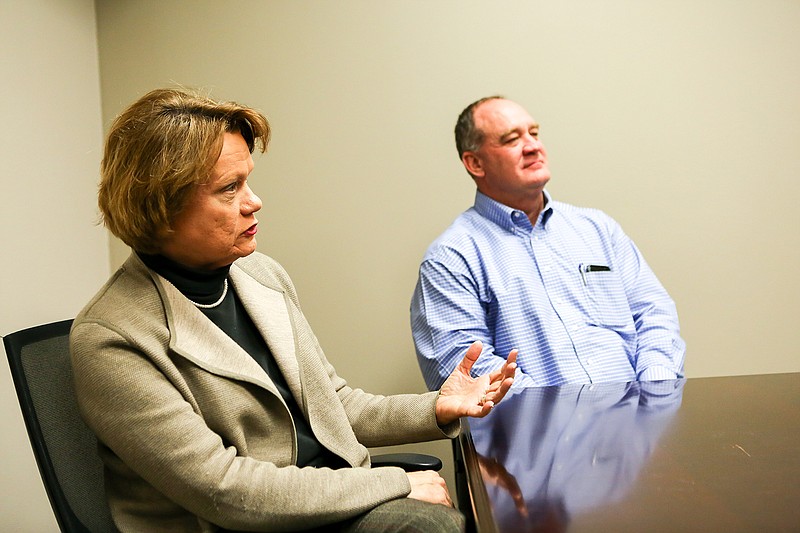Three issues-reducing bureaucracy, lowering taxes and funding transportation infrastructure-will be the main concerns of the Arkansas legislative session about to convene, Texarkana's delegation said in an interview Friday.
Rep. Carol Dalby, R-Texarkana, and Sen. Jimmy Hickey Jr., R-Texarkana, spoke about their expectations for the 92nd Arkansas General Assembly set to begin Monday in Little Rock. But first they addressed an issue of perennial concern in Texarkana: whether the state's border city income tax exemption will remain in place.
The answer is that Texarkanians will probably continue to avoid state income taxes, especially since the Legislature's tax-overhaul task force-on which Hickey serves-recently ended its work without recommending nixing the border city exemption. Still, no one can predict what individual lawmakers will do, Dalby and Hickey said.
"The governor has come out in support of our tax exemption. He feels like it's vital for the economic development and the vitality of Texarkana, Ark. The task force did not come out with a recommendation to do away with it. With all that being said, anybody can file a bill," Dalby said.
"Any member while we're in session could file a bill to eliminate it. So we just have to be diligent, and if it comes up, then we will address it at that point," Hickey said.
INCOME TAX REDUCTION
Because Republicans hold a 76 to 24 majority in the House of Representatives and a 27 to nine advantage in the Senate, passage of a measure to reduce the state's individual income tax rates is almost certain. But what form the final legislation will take is a work in progress.
Hutchinson has proposed a four-year plan that would result in a top rate of 5.9 percent. The tax-overhaul task force has recommended implementing the plan in three years, with a two-year plan as its second choice. A third plan, which would result in a top rate of 6.5 percent after three years, is the task force's last choice.
Some of the plans would result in higher taxes for some people, so they would require the votes of a super-majority-27 senators and 75 representatives-to pass.
Dalby and Hickey have their eyes on the issue and are waiting to see which specific proposal the legislative process eventually will produce.
"They are still working on that bill. We have not seen the governor's bill, and we've not seen whether the tax task force bill is going to remain the same, so we're kind of in a wait and see," Dalby said.
GOVERNMENT AGENCY CONSOLIDATION
Republican Gov. Asa Hutchinson's ambitious plan to consolidate state agencies that report to him, reducing the number from 42 to 15, often will be at center stage during the session.
"It is a massive bill," Hickey said.
Hickey serves on the Senate's State Agencies and Governmental Affairs Committee, which has the task of vetting the 1,500-page consolidation bill. The committee must be sure that any agency with good reason to be independent is not consolidated with others mistakenly, he said.
"The thing we're wanting to do sitting on State Agencies is make sure that we give due diligence to the bill and that also we allow the stakeholders to have a voice in this, and the community members.
"We definitely want to put our time into it. I'm going to do everything I can to make sure I read every word in that bill," Hickey said, adding that he already has some concerns.
"I've started going through it, and I do have questions whenever we get into committee on that," he said.
HIGHWAY FUNDING
Just maintaining Arkansas' highways costs $400 million to $478 million a year, so finding the funding to improve roads beyond that is a challenge, Hickey said.
"Unfortunately, the need to bring our infrastructure in Arkansas back up to where it needs to be takes a lot of money. There is no way in the world that you can take that out of general revenue, because it's not there," he said, adding that doing so would be undesirable anyway because Arkansas taxpayers would bear all of the financial burden. A fuel tax increase, however, would shift some of the cost to people who do not live in the state.
"If you put it on as a fuel tax some way, somehow, then it's spread out not only among the population in Arkansas, but it's spread out across anyone that's traveling through," Hickey said.
Voters could pass a bond issue to pay for highway improvements, but the resulting financing expenses would add 25 to 27 percent to the overall cost, he said. And using an amendment to the state constitution as a fundraising mechanism would make the law too difficult to change at pace with evolving technology and other circumstances.
RAISES FOR TEACHERS
Both Dalby and Hickey support Hutchinson's proposal to raise the starting public teacher salary from $31,800 to $36,000 a year, another measure expected to have broad support.
Dalby pointed out that locally, teachers are paid more than some of their counterparts elsewhere in Arkansas.
"Fortunately, Texarkana, Ark., School District already pays above the minimum. I'm supportive of (the raise). Certainly our teachers are never getting paid enough, I don't think. But we're lucky here," she said.
The 92nd Arkansas General Assembly convenes Monday and will last for 60 days unless the Legislature votes to extend it.

